

Paul
Teacher/Instructional Coach ESL EdTech Social Justice Progressive Education Reform (not the corporate kind)
Wabdr-gps-tracks.
Learning a language with the iPad. iPad Use for Every Learner - Univesal Access and UDL. Ol Tools for 21st Century Learners: 14 Resources for AppSmashing with ThingLink. In November I launched the ThingLink AppSmash Challenge to encourage educators to share great ways to combine two or more apps together to create, publish and share content using ThingLink as a presentation tool.
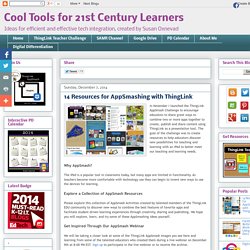
The goal of the challenge was to create resources to help educators discover new possibilities for teaching and learning with an iPad to better meet our teaching and learning needs. Why AppSmash? The iPad is a popular tool in classrooms today, but many apps are limited in functionality. SAGE Advice for New Teachers. I recently re-connected with a former 6th grade student of mine.
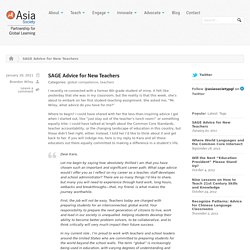
It felt like yesterday that she was in my classroom, but the reality is that this week, she’s about to embark on her first student-teaching assignment. She asked me, “Mr. It is Personal and Dangerous Now. 2013 has been an interesting year.
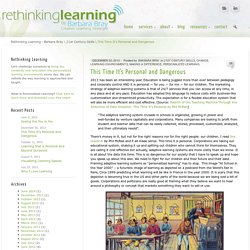
The Conversation We Need To Have With Leadership. Parents and Technology. Instructional Tech Resources. Google and Ed Tech (iPad Focus) VanSD Tech. Standardized Testing. Education Policy. Still need to Categorize. EdTech, Equity and Social Justice. Open Ed Resources. International Teaching. Teaching and Learning. Oregon History. Common Core. Project Based Learning. Politics. The deprofessionalization of teaching. Research Specific. Video Resources for Educators.
Portland and Oregon. Reclaiming the Conversation on Education: Brian Jones. Academic Innovations, Publisher of Career Choices. What Work Requires of Schools is the title of the initial SCANS report.
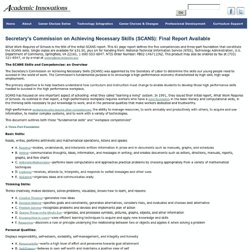
This 61 page report defines the five competencies and three-part foundation that constitute the SCANS skills. Single copies are available for $31.50, plus $4 for handling from: National Technical Information Service (NTIS), Technology Administration, U.S. Department of Commerce, Springfield, VA 22161, 1-800-553-6847. NTIS Order Number: PB92-146711INZ. This product may also be ordered by fax at (703) 321-8547, or by e-mail at orders@ntis.fedworld.gov The SCANS Skills and Competencies: an Overview The Secretary's Commission on Achieving Necessary Skills (SCANS) was appointed by the Secretary of Labor to determine the skills our young people need to succeed in the world of work.
The primary objective is to help teachers understand how curriculum and instruction must change to enable students to develop those high performance skills needed to succeed in the high performance workplace. A Three-Part Foundation Basic Skills: You think you know what teachers do. Right? Wrong. (By Charles Rex Arbogast/ AP) You went to school so you think you know what teachers do, right?

You are wrong. Here’s a piece explaining all of this from Sarah Blaine, a mom, former teacher and full-time practicing attorney in New Jersey who writes at her parentingthecore blog, where this first appeared.
Take a Break. Would greater teacher independence help student performance? JUDY WOODRUFF: Next: addressing the high turnover rate among public school teachers.
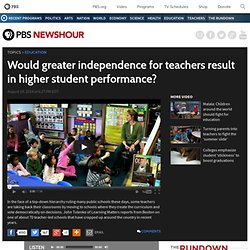
John Tulenko of Learning Matters Television, which produces reports for the NewsHour, looks at a Boston school where the teachers have taken charge. JOHN TULENKO: For more than 20 years, Susan Sluyter loved being a public schoolteacher. But starting around 2001 with passage of the education law known as No Child Left Behind, her feelings began to change. SUSAN SLUYTER: I started to feel deadened. I felt like I had lost inspiration. Northwest Conference on Teaching for Social Justice. University School Literacy and Culture. A summary from "The Early Catastrophe: The 30 Million Word Gap by Age 3" by University of Kansas researchers Betty Hart and Todd R.
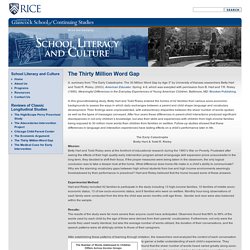
Risley. (2003). American Educator. Spring: 4-9, which was exerpted with permission from B. Hart and T.R. On LAUSD's Failed iPad Program — Chambers Daily. Howard Blume: Los Angeles school district officials have allowed a group of high schools to choose from among six different laptop computers for their students — a marked contrast to last year's decision to give every pupil an iPad.

Contracts that will come under final review by the Board of Education on Tuesday would authorize the purchase of one of six devices for each of the 27 high schools at a cost not to exceed $40 million. In the fall, administrators, teachers and students at those schools will test the laptops to determine whether they should be used going forward. What they learn will affect the future of an ongoing effort to provide computers for all students in the nation's second-largest school system. How a Radical New Teaching Method Could Unleash a Generation of Geniuses.
In 2009, scientists from the University of Louisville and MIT's Department of Brain and Cognitive Sciences conducted a study of 48 children between the ages of 3 and 6.
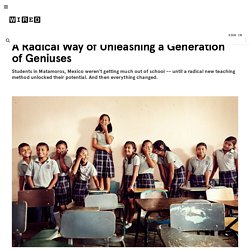
The kids were presented with a toy that could squeak, play notes, and reflect images, among other things. For one set of children, a researcher demonstrated a single attribute and then let them play with the toy. Another set of students was given no information about the toy. This group played longer and discovered an average of six attributes of the toy; the group that was told what to do discovered only about four. A similar study at UC Berkeley demonstrated that kids given no instruction were much more likely to come up with novel solutions to a problem.
Gopnik's research is informed in part by advances in artificial intelligence. Seven things teachers are sick of hearing from school reformers. A senior from TechBoston Academy reacts as President Obama walks into her classroom with Melinda Gates (C) and Education Secretary Arne Duncan (R) in Boston in 2011.
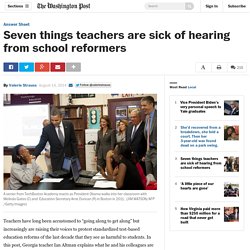
(JIM WATSON/AFP/Getty Images) Teachers have long been accustomed to “going along to get along” but increasingly are raising their voices to protest standardized test-based education reforms of the last decade that they see as harmful to students. In this post, Georgia teacher Ian Altman explains what he and his colleagues are really sick of hearing from reformers. Altman is an award-winning high school English teacher in Athens, where he has lived since 1993, as well as an advocate for teachers and students. He has presented at several national conferences and published in the Journal of Language and Literacy Education.